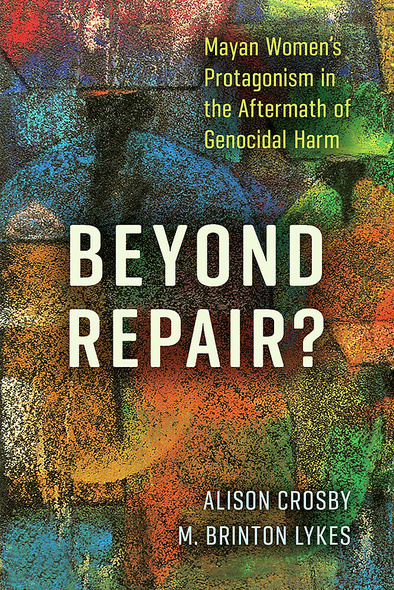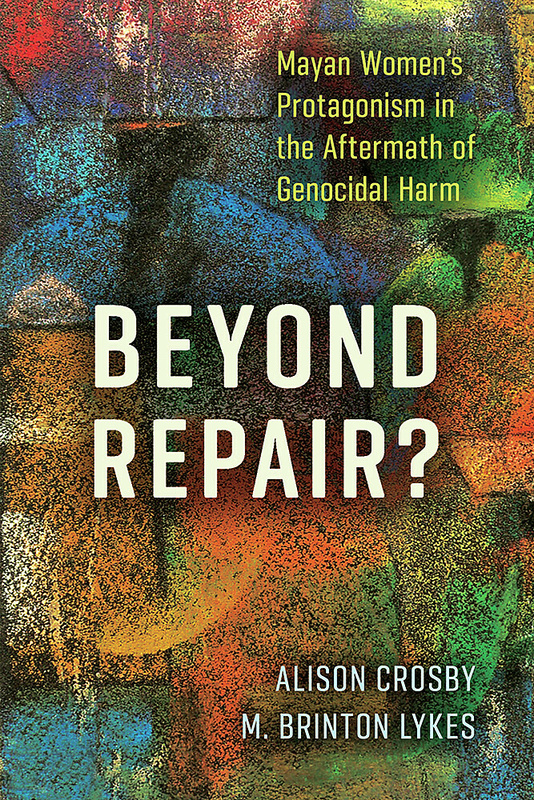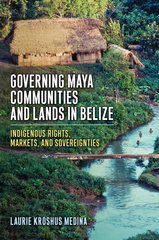Beyond Repair?
Mayan Women's Protagonism in the Aftermath of Genocidal Harm
By Alison Crosby and M. Brinton Lykes
Rutgers University Press
Winner of the 2021 Raphael Lemkin Book Award from the Institute for the Study of Genocide
Honorable Mention, 2020 CALACS Book Prize
Beyond Repair? explores Mayan women’s agency in the search for redress for harm suffered during the genocidal violence perpetrated by the Guatemalan state in the early 1980s at the height of the thirty-six-year armed conflict. The book draws on eight years of feminist participatory action research conducted with fifty-four Q’eqchi’, Kaqchikel, Chuj, and Mam women who are seeking truth, justice, and reparation for the violence they experienced during the war, and the women’s rights activists, lawyers, psychologists, Mayan rights activists, and researchers who have accompanied them as intermediaries for over a decade. Alison Crosby and M. Brinton Lykes use the concept of “protagonism” to deconstruct dominant psychological discursive constructions of women as “victims,” “survivors,” “selves,” “individuals,” and/or “subjects.” They argue that at different moments Mayan women have been actively engaged as protagonists in constructivist and discursive performances through which they have narrated new, mobile meanings of “Mayan woman,” repositioning themselves at the interstices of multiple communities and in their pursuit of redress for harm suffered.
Honorable Mention, 2020 CALACS Book Prize
Beyond Repair? explores Mayan women’s agency in the search for redress for harm suffered during the genocidal violence perpetrated by the Guatemalan state in the early 1980s at the height of the thirty-six-year armed conflict. The book draws on eight years of feminist participatory action research conducted with fifty-four Q’eqchi’, Kaqchikel, Chuj, and Mam women who are seeking truth, justice, and reparation for the violence they experienced during the war, and the women’s rights activists, lawyers, psychologists, Mayan rights activists, and researchers who have accompanied them as intermediaries for over a decade. Alison Crosby and M. Brinton Lykes use the concept of “protagonism” to deconstruct dominant psychological discursive constructions of women as “victims,” “survivors,” “selves,” “individuals,” and/or “subjects.” They argue that at different moments Mayan women have been actively engaged as protagonists in constructivist and discursive performances through which they have narrated new, mobile meanings of “Mayan woman,” repositioning themselves at the interstices of multiple communities and in their pursuit of redress for harm suffered.
Extremely persuasive and admirably clear, Beyond Repair? emphasizes the need to analyze gender violence through the historical lens of colonialized racial violence and underlines the centrality of the justice constructions and engagements of Mayan women.
This deeply researched book follows Mayan women as they search for justice in the aftermath of sexual violence. Using feminist participatory research methods, the authors attend to both suffering and protagonism.
Highly recommended.
New Books Network - New Books in Genocide Studies' interview with Alison Crosby and M. Brinton Lykes
https://newbooksnetwork.com/a-d-crosby-and-m-b-lykes-in-beyond-repair-mayan-womens-protagonism-in-the-aftermath-of-genocidal-harm-rutgers-up-2019/
Human rights scholars and activists will plumb this rich text for insights into the limitations of our legalistic understanding of human rights. Psychologists will find inspiration in the curative aspects of indigenous practices. Researchers will reevaluate how to conduct feminist, postcolonial PAR work. Feminists will rethink our work on identity and activism. And all of us will reach a fuller understanding of the human capacity for resistance and recovery from gross injustices and atrocities.
Crosby and Lykes offer readers a unique opportunity to hear the voices of Mayan women who come together around pain and justice, and to learn about their mixed emotions and their experiences of poverty, peril, fear, and resiliency.
Beyond Repair presents a valuable framework in which to understand how broader legal mechanisms can be deployed within transitional justice and human rights approaches.
ALISON CROSBY is an associate professor in the School of Gender, Sexuality and Women’s Studies and the director of the Centre for Feminist Research at York University, Toronto, Canada.
M. BRINTON LYKES is a professor of community-cultural psychology and co-director of the Center for Human Rights and International Justice at Boston College, in Massachusetts. She is the author or editor of several books, including The New Deportations Delirium: Interdisciplinary Responses.
M. BRINTON LYKES is a professor of community-cultural psychology and co-director of the Center for Human Rights and International Justice at Boston College, in Massachusetts. She is the author or editor of several books, including The New Deportations Delirium: Interdisciplinary Responses.
Contents
List of Abbreviations
Introduction
1 Documenting Protagonism: “I can fly with large wings”
2 Recounting Protagonism: “No one can take this thorn from my soul”
3 Judicializing Protagonism: “What will the law say?”
4 Repairing Protagonism: “Carrying a heavy load”
5 Accompanying Protagonism: “Facing two directions”
Conclusion
Acknowledgments
Notes
References
Index
List of Abbreviations
Introduction
1 Documenting Protagonism: “I can fly with large wings”
2 Recounting Protagonism: “No one can take this thorn from my soul”
3 Judicializing Protagonism: “What will the law say?”
4 Repairing Protagonism: “Carrying a heavy load”
5 Accompanying Protagonism: “Facing two directions”
Conclusion
Acknowledgments
Notes
References
Index







